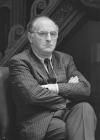Quotes by Joseph Brodsky
After all, it is hard to master both life and work equally well. So if you are bound to fake one of them, it had better be life.
Twentieth-century Russian literature has produced nothing special except perhaps one novel and two stories by Andrei Platonov, who ended his days sweeping streets.
Man is what he reads.
Civilization is nothing more than the effort to reduce the use of force to the last resort.
Were art to redeem man, it could do so only by saving him from the seriousness of life and restoring him to an unexpected boyishness.
The good is, like nature, an immense landscape in which man advances through centuries of exploration.
There may be as much nobility in being last as in being first, because the two positions are equally necessary in the world, the one to complement the other.
Liberalism -- it is well to recall this today -- is the supreme form of generosity; it is the right which the majority concedes to minorities and hence it is the noblest cry that has ever resounded in this planet. It announces the determination to share existence with the enemy; more than that, with an enemy which is weak.
To rule is not so much a question of the heavy hand as the firm seat.
There is but one way left to save a classic: to give up revering him and use him for our own salvation.
The characteristic of the hour is that the commonplace mind, knowing itself to be commonplace, has the assurance to proclaim the rights of the commonplace and to impose them wherever it will.
We do not live to think, but, on the contrary, we think in order that we may succeed in surviving.
In order to master the unruly torrent of life the learned man meditates, the poet quivers, and the political hero erects the fortress of his will.
An unemployed existence is a worse negation of life than death itself.
Towns are full of people, houses full of tenants, hotels full of guests, trains full of travelers, caf?s full of customers, parks full of promenaders, consulting-rooms of famous doctors full of patients, theatres full of spectators, and beaches full of bathers. What previously was, in general, no problem, now begins to be an everyday one, namely, to find room.
The cynic, a parasite of civilization, lives by denying it, for the very reason that he is convinced that it will not fail.
The surest defense against Evil is extreme individualism, originality of thinking, whimsicality, even-if you will-eccentricity. That is, something that can't be feigned, faked, imitated; something even a seasoned imposter couldn't be happy with.
Stupefaction, when it persists, becomes stupidity.
Effort is only effort when it begins to hurt.
Every intellectual effort sets us apart from the commonplace, and leads us by hidden and difficult paths to secluded spots where we find ourselves amid unaccustomed thoughts.
We live at a time when man believes himself fabulously capable of creation, but he does not know what to create.
Better beware of notions like genius and inspiration; they are a sort of magic wand and should be used sparingly by anybody who wants to see things clearly.
For aesthetics is the mother of ethics. Were we to choose our leaders on the basis of their reading experience and not their political programs, there would be much less grief on earth. I believe-not empirically, alas, but only theoretically-that for someone who has read a lot of Dickens to shoot his like in the name of an idea is harder than for someone who has read no Dickens.
A revolution does not last more than fifteen years, the period which coincides with the flourishing of a generation.
I am I plus my surroundings and if I do not preserve the latter, I do not preserve myself.






